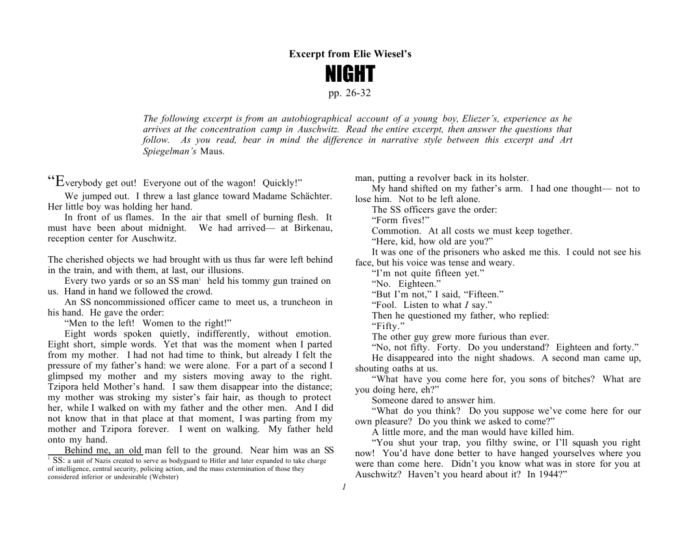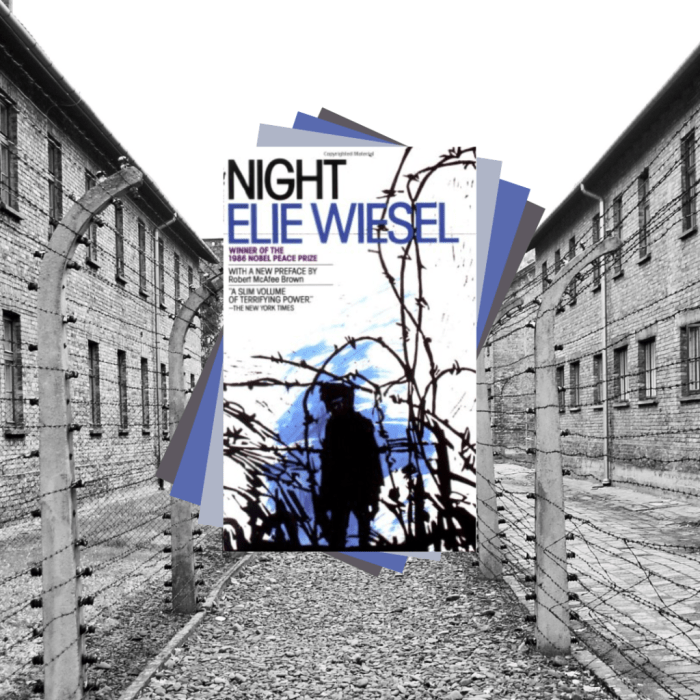With Night Excerpt by Elie Wiesel, we embark on a poignant journey through the darkness of the Holocaust and the resilience of the human spirit. This powerful literary masterpiece has captivated readers worldwide, shedding light on one of history’s most harrowing events.
Elie Wiesel’s harrowing account of his experiences in Auschwitz-Birkenau confronts the profound themes of faith, evil, and the indomitable will to survive.
Introduction
Elie Wiesel was a Romanian-born American writer, professor, political activist, Nobel laureate, and Holocaust survivor. He is best known for his book “Night,” a memoir of his experiences as a Jewish prisoner in the Auschwitz and Buchenwald concentration camps during the Holocaust.
“Night” is a powerful and moving account of the horrors of the Holocaust and its devastating impact on the human spirit. It has been translated into more than 30 languages and has sold more than 10 million copies worldwide.
Night Excerpt by Elie Wiesel powerfully portrays the horrors of the Holocaust. Despite the darkness, hope glimmers through the resilience of the human spirit. Much like the NECA Manual of Labor Units , which provides a guide for quantifying labor costs, Wiesel’s work illuminates the immeasurable value of human life and the enduring power of the human spirit in the face of adversity.
The Holocaust
The Holocaust was a genocide in which the Nazi regime of Germany, under Adolf Hitler, systematically murdered approximately six million Jews during World War II. The Holocaust was carried out in concentration and extermination camps across German-occupied Europe.
Wiesel’s experiences in the Holocaust had a profound impact on his writing. He dedicated his life to speaking out against injustice and intolerance, and he became a leading voice for Holocaust remembrance and education.
Themes in “Night”

“Night” by Elie Wiesel explores profound and enduring themes that resonate deeply with the human experience. These themes, including faith, evil, and resilience, are woven throughout the narrative, offering a complex and multifaceted portrayal of humanity’s struggles and triumphs.
Faith and the Loss of Faith
Wiesel’s novel confronts the profound crisis of faith that the Holocaust posed for many Jews. The horrors witnessed in the concentration camps challenged traditional beliefs and raised fundamental questions about the existence and nature of God. Eliezer’s own faith is tested to its limits as he experiences unspeakable suffering and cruelty.
He grapples with doubts, anger, and a sense of abandonment, ultimately questioning whether a benevolent God could allow such atrocities to occur.
However, despite his struggles, Eliezer’s faith is not entirely extinguished. Even in the depths of despair, he clings to a flicker of hope and a belief in the inherent goodness of humanity. This resilience is a testament to the enduring power of faith, even in the face of unimaginable adversity.
The Nature of Evil
“Night” delves into the disturbing depths of human depravity and the nature of evil. The novel depicts the perpetrators of the Holocaust as ordinary men who willingly commit heinous acts of cruelty and violence. Wiesel challenges the notion that evil is something extraordinary or supernatural, instead suggesting that it is a latent potential within all human beings.
The novel explores the corrosive effects of evil on both its victims and perpetrators. Eliezer witnesses the dehumanization of his fellow prisoners and the moral decay that consumes the guards. The Holocaust becomes a chilling reminder of the fragility of civilization and the ease with which humanity can descend into barbarism.
The Resilience of the Human Spirit
Despite the horrors endured in the concentration camps, “Night” also celebrates the indomitable spirit of human resilience. Eliezer and his fellow prisoners demonstrate an extraordinary capacity to endure unimaginable suffering and maintain their humanity. They find solace in small acts of kindness, friendship, and hope.
Wiesel’s novel reminds us that even in the darkest of times, the human spirit can prevail. It is a testament to the strength of the human will and the enduring power of hope in the face of adversity.
Characters in “Night”

Elie Wiesel’s Nightfollows the experiences of a young Jewish boy named Eliezer and his father during the Holocaust. The novel portrays the profound impact of the Nazi regime on individuals, families, and communities.
Eliezer
Eliezer is the protagonist and narrator of Night. As a young teenager, he is forced to confront the horrors of the Holocaust firsthand. Initially devout and innocent, Eliezer’s faith and spirit are gradually eroded by the atrocities he witnesses. Through his eyes, readers experience the unimaginable suffering and loss inflicted upon the Jewish people.
Eliezer’s Father, Night excerpt by elie wiesel
Eliezer’s father is a respected and devout man who struggles to reconcile his belief in God with the horrors he encounters in the camps. As a pillar of strength and guidance for Eliezer, his father’s faith and determination are tested to their limits.
Their relationship, forged in adversity, serves as a testament to the resilience of the human spirit.
The Other Prisoners
Eliezer’s fellow prisoners come from diverse backgrounds and experiences. They include young children, elderly men and women, and rabbis. Each individual grapples with the unimaginable horrors of the camps in their own way. Their stories and interactions provide a glimpse into the collective suffering and the indomitable spirit of those who endured the Holocaust.
Symbolism in “Night”: Night Excerpt By Elie Wiesel

Elie Wiesel’s “Night” is a powerful and haunting novel that explores the horrors of the Holocaust through the eyes of a young boy named Eliezer. The novel is filled with symbolism, which adds to the work’s overall meaning and impact.
Darkness and Light
One of the most important symbols in “Night” is the contrast between darkness and light. Darkness represents the evil and suffering that Eliezer experiences during his time in the concentration camps. The light, on the other hand, represents hope and redemption.
Eliezer’s journey from darkness to light is a metaphor for his own spiritual journey and the journey of the Jewish people as a whole.
The Train Journey
The train journey to the concentration camps is another important symbol in “Night.” The train represents the journey to hell. It is a place of darkness, overcrowding, and suffering. The train journey also symbolizes the loss of innocence and the beginning of Eliezer’s transformation into a hardened survivor.
The Concentration Camp
The concentration camp is the ultimate symbol of evil in “Night.” It is a place of unimaginable suffering and death. The camp represents the Nazis’ attempt to destroy the Jewish people and their culture. It is also a place where Eliezer’s faith in God is tested to the limit.
Literary Devices in “Night”

Elie Wiesel’s “Night” is a profound and harrowing memoir that employs a range of literary devices to convey the horrors of the Holocaust and explore its profound themes.
Imagery
Wiesel’s vivid and evocative imagery transports the reader into the heart of the Nazi concentration camps. He depicts the “oven’s flames” that “licked the darkness” and the “starved faces” of the prisoners, creating a visceral and unforgettable portrayal of the physical and psychological torment they endured.
Metaphor
Wiesel uses metaphors to draw parallels between the Holocaust and other historical and biblical events. The prisoners are likened to “sheep” led to the slaughter, highlighting their vulnerability and the dehumanizing nature of their treatment.
Irony
Wiesel employs irony to emphasize the absurdity and cruelty of the Nazi regime. He describes the “selection” process, where prisoners were forced to line up and be judged for their fitness to work or die, as a “game” played by the guards.
This juxtaposition of the innocence of a game with the horrors of the Holocaust underscores the profound moral bankruptcy of the Nazi ideology.These literary devices work in concert to create a deeply immersive and emotionally resonant narrative that compels the reader to confront the horrors of the Holocaust and its enduring legacy.
Impact of “Night”

Elie Wiesel’s “Night” has had a profound impact on readers worldwide, raising awareness of the horrors of the Holocaust and its lasting consequences. The novel has become a cornerstone of Holocaust education, providing a deeply personal and moving account of the atrocities committed during that dark chapter in human history.
Raising Awareness of the Holocaust
- “Night” has helped to educate generations about the Holocaust, shedding light on the systematic extermination of millions of Jews and other minority groups by the Nazi regime.
- Wiesel’s vivid and harrowing descriptions of the concentration camps have brought the horrors of the Holocaust to life for countless readers, making the unimaginable tangible and fostering empathy.
- The novel has played a crucial role in preserving the memory of the victims and ensuring that their stories are not forgotten.
Relevance to Contemporary Issues
Despite being written decades ago, “Night” remains deeply relevant to contemporary issues of genocide and human rights violations. The novel serves as a powerful reminder of the dangers of hatred, intolerance, and the importance of standing up against tyranny.
- In the face of ongoing genocides and human rights abuses, “Night” offers a stark warning about the consequences of indifference and inaction.
- The novel’s message of resilience and hope in the face of adversity inspires individuals and communities to fight for justice and human dignity.
- “Night” continues to be a source of strength and inspiration for those who work to prevent future atrocities and promote peace.
Clarifying Questions
What is the significance of the title “Night”?
The title “Night” symbolizes the darkness and despair of the Holocaust, as well as the inner turmoil and loss of faith experienced by Eliezer.
How does Eliezer’s faith evolve throughout the novel?
Eliezer’s faith is initially strong, but it is gradually eroded by the horrors he witnesses. By the end of the novel, he has lost his belief in God.
What is the role of symbolism in “Night”?
Wiesel uses symbolism extensively in “Night” to convey the novel’s themes. For example, the darkness represents the Holocaust, while the light represents hope and faith.